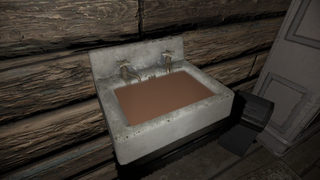Phasmophobia's developer knows the dirty water objective is a cruel joke
That sinking feeling.

Phasmophobia is one of my favourite games of the year, a unique and brilliantly judged co-op ghost hunting experience. But even then, it has flaws, and one in particular is so comical it's equal parts beloved and hated by players: 'Capture a photo of Dirty Water in a sink.'
Considering some of the other stuff you do in Phasmophobia, like taunting ghosts in a darkened room, this seems like it should be a walk in the park. But it is the most inconsistent behaviour in the game: very often, you'll have identified the ghost, ticked off every other objective, seen loads of activity, but no dirty water anywhere. I can't tell you how many times my team's stood around a bathroom begging for a sign, trying to gee up the ghost to just turn on the god damn tap PLEASE. At which point it usually chooses to kill one of us instead.
Developer Kinetic Games knows the truth, making an Attenborough-channeling joke about this event's rarity.
The rarest of creatures tempted out of its natural habitat #Phasmophobia pic.twitter.com/Y1m9nvpkcQNovember 16, 2020
This may be a reference to some under-the-hood changes, as since last week's update I've had a few games where the ghosts were filling sinks like crazy, particularly in the School level. Naturally, that happened when dirty water was not one of my objectives. When it is, it remains as elusive as ever.
The community's love/hate affair with this dirty water has also resulted in my favourite Phasmophobia meme to date, a script for the classic 'Laughing Man' clip.
The above is funny, but every word is true. I think chasing dirty water's probably got me killed more than any single other element of Phasmophobia. Which, one has to admit, shows it's working somewhat as intended.
The biggest gaming news, reviews and hardware deals
Keep up to date with the most important stories and the best deals, as picked by the PC Gamer team.
Rich is a games journalist with 15 years' experience, beginning his career on Edge magazine before working for a wide range of outlets, including Ars Technica, Eurogamer, GamesRadar+, Gamespot, the Guardian, IGN, the New Statesman, Polygon, and Vice. He was the editor of Kotaku UK, the UK arm of Kotaku, for three years before joining PC Gamer. He is the author of a Brief History of Video Games, a full history of the medium, which the Midwest Book Review described as "[a] must-read for serious minded game historians and curious video game connoisseurs alike."
Most Popular






